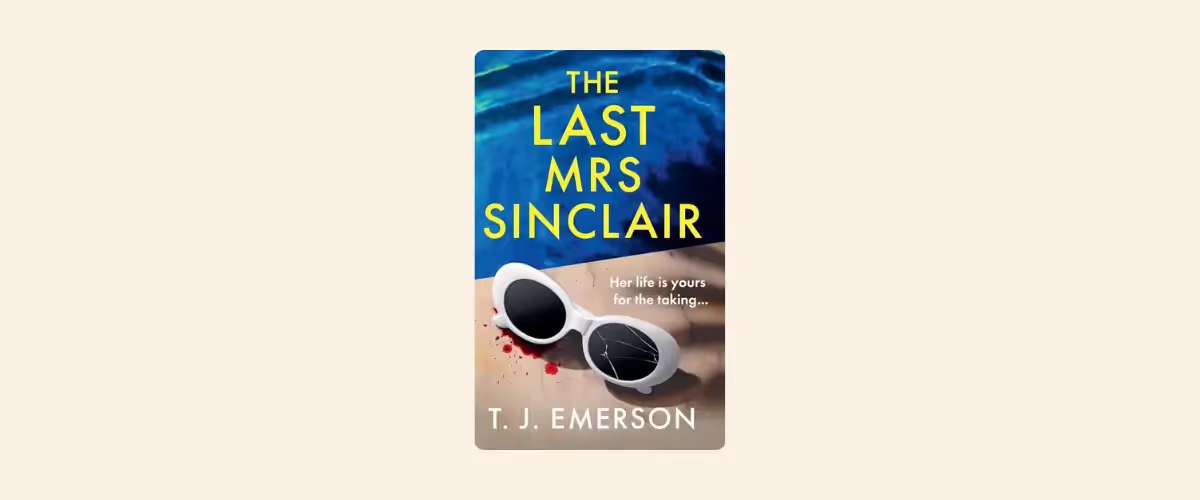You may have noticed a rise in the number of books, TV shows, and movies in which our protagonist is a woman who has just had enough. She is angry, on the edge, and unprepared to take it anymore.
This may seem like a recent trend, but the truth is, authors have been writing female characters who are fighting for agency in a corner of their story’s world for some time now. You don’t have to look too far along the shelves of classic literature to find what some might call an antiheroine.
In today’s blog, we warmly welcome T.J. Emerson, one of our published graduates at The Novelry, to discuss this element of storytelling. A graduate of The Novel Development Course and The Advanced Outline Class, T.J. Emerson is the author of psychological thrillers Mother’s Day, The Perfect Holiday, The Ideal Man, and The Last Resort. T.J.’s latest novel, The Last Mrs Sinclair, is set in a château in the French countryside and follows the story of Leah Williams, a young woman determined to secure her own life of luxury and financial security by marrying a rich man.
Read on to find out how one particular literary classic inspired T.J. to write Leah the way she deserved to be written.

Rise of the female rage books
Novels and plays throughout history have starred women who insist on doing it their way. But never in such numbers as now.
—Parul Sehgal, The New York Times
In her article ‘Women Writers Give Voice to Their Rage’, literary critic Parul Sehgal examines a recent surge in novels driven by seething, enraged and sinister female protagonists. These novels, she claims, ‘bespeak a frustration with femaleness itself, a condition of unbearable narrowness and constriction’.
Over the past decade, the anti-heroines of ‘female rage fiction’, as this subgenre has come to be known, have attempted to escape this unbearable constriction. Unconventional, angry and often violent, they express the emotions women have traditionally been taught to suppress.
Often included in the best-of female rage lists are Ottessa Moshfegh’s My Year of Rest and Relaxation, My Sister, the Serial Killer by Oyinkan Braithwaite, Naomi Alderman’s The Power, Rachel Yoder’s Nightbitch and How to Kill Your Family by Bella Mackie.

I was pleased to see Gillian Flynn’s Gone Girl on one such list. Much of the recent discussion about angry female characters has focused on literary fiction, but crime and thriller writers have long been challenging notions of acceptable femaleness, giving us not only vengeful victims and dangerous obsessives but also, as Flynn describes them, ‘just pragmatically evil, bad and selfish women’. The protagonist of Gone Girl, Amy Dunne, is one such woman, and her cold-blooded scheming paved the way for other amoral anti-heroines to be their very worst selves.
The need for female power and agency
Seghal describes us as living in an ‘age of rage’—and no wonder. The list of misogynistic offences endured by women and girls daily is depressingly endless and impossible for me to cover fully here, but it includes physical, psychological and sexual abuse (often in domestic settings), inequalities at work and at home and a disturbing backlash against women’s rights that has led to the dismantling of our reproductive rights in parts of the USA and other countries.
In early 2024, these issues were on my mind as I was developing ideas for my next novel, a thriller that would eventually become The Last Mrs Sinclair. I knew I wanted to write a young female protagonist who unashamedly sets out to take what she wants from life, not unlike the protagonists of female rage fiction. Through her, I wanted to explore female power, decision-making and agency.
%20(1).avif)
While researching, I was surprised to discover that many young women were responding to the ‘unbearable narrowness’ of contemporary female existence not with rage, but with apathy and cynicism. In her fascinating 2023 Guardian article, Kimberly McIntosh explores the rise of influencers such as SheraSeven, who describes herself as a financial adviser and encourages young women to find affluent older men and date them for money. Giving the gold-digger archetype a pseudo-feminist makeover, she cynically urges women to claim back their power and take men for what they can get. She, and other influencers like her, teach their followers how to psychologically manipulate men and how to fake intimacy in order to avoid emotional vulnerability.
McIntosh claims these influencers are finding an audience for two main reasons. Firstly, many younger women are suffering burnout from working long hours in jobs that barely meet their financial needs. Secondly, women are fed up with modern heterosexual dating, at best because they don’t believe men have anything to offer them emotionally, and at worst, because they want to protect themselves from abuse of any kind.
This apathy towards traditional relationships is reflected by the current popularity of the term ‘heteropessimism’ in our culture. Many women experiencing these feelings of hopelessness about the straight experience are avoiding relationships altogether, defining themselves as ‘boy-sober’ and ‘self-partnered’, an approach totally opposed to that of influencers like SheraSeven. She not only wants her followers to engage with men, she wants them to game the patriarchy.
The anti-heroine
I emerged from my rabbit hole of research with conflicted feelings. I was appalled by the mercenary advice dished out by SheraSeven, but I also couldn’t help admiring her brazen attitude to getting what she wanted.
I wondered how the reality of using a wealthy man for money would measure up against the dream of a luxurious life. How might such a transactional relationship really feel? How real is the power young women can wield in these situations and what are its limitations?
This, I decided, was the situation I wanted to explore, and my 24-year-old protagonist, Leah Williams, was to be a morally ambiguous anti-heroine on a mission to find herself a rich husband and live a life of luxury and security. The life she would have had if her childhood hadn’t been derailed by her father’s bad decisions.
After spending all of Leah’s mother’s inheritance on dodgy business schemes, her father abandoned the family. Leah’s story became one of riches to rags. Her mother, crushed and embittered by her change in circumstances, encouraged Leah to use men for money and never to fall in love. All relationships are based on power, not love was one of her favourite mantras, and neatly expresses the theme of the novel.
When we first meet Leah, her mother is dead, but her mantras live on and influence Leah even more than the online gurus she has learned her tricks from. At this point in her life, Leah is broke, her wages from her dead-end job in an insurance firm barely covering her rent and living expenses. Tired of gambling on the potential of young, emotionally immature men, she spends her nights in the bars of London’s five-star hotels, seeking a mature investment. One night, she strikes lucky and meets Miles Sinclair, a rich, 54-year-old widower whose wife, Riley, died a year earlier in a tragic accident.
Taking inspiration from Daphne du Maurier’s Rebecca
As I was developing Leah’s character, I saw obvious parallels with Daphne du Maurier’s classic novel, Rebecca, in which a naïve young woman falls for an older widower. What if, I asked myself, this novel’s narrator had been a streetwise gold digger like Leah instead of an unworldly girl? This question was the spark that brought my story to life.
The Last Mrs Sinclair is the fourth published novel I’ve written as a member of The Novelry. An essential part of all The Novelry’s courses is the Hero Book. This book must be a successful novel from your genre with a clear story structure that can inspire and inform your writing process. I had no hesitation in choosing Rebecca as my Hero Book for this project.
Stephen King has said of the novel that ‘Du Maurier created a scale by which modern women can measure their feelings.’ I decided to see if he was right. By exploring the differences between Leah and the narrator of Rebecca, could my contemporary tale find meaning in and take inspiration from Du Maurier’s classic?
Enter the second Mrs de Winter
Rebecca’s young and symbolically nameless narrator (I’ll call her N for brevity) is working as a companion to a wealthy lady in Monte Carlo when she meets and falls desperately in love with Max de Winter, an older widower whose wife, Rebecca, died the previous year in a sailing accident. N accepts Max’s sudden marriage proposal and returns to his family estate, Manderley, as the second Mrs de Winter.
Unlike N, Leah has actively sought out her wealthy widower and when, after five weeks together, Miles invites her to holiday with him at his château in the French countryside, she feels she’s finally getting a taste of the life she deserves. But the Château Clairvallon has a history, not least as the place where Miles’ first wife died. Leah also has to endure the presence of Miles’ cousin, Vivienne, who is acting as housekeeper at the château and, like Mrs Danvers in Rebecca, seems determined to keep the memory of the dead first wife alive.
.avif)
In her introduction to the 2003 Virago edition of Rebecca, Sally Beauman described the second Mrs de Winter as desperate for the validation provided by a man’s love. N, a hopeless romantic, describes herself as gripped by ‘the fever of first love’.
Leah has no romantic illusions about Miles. She cares about him, but when she accepts his unexpected marriage proposal, she is fully aware of the transactional relationship she will be entering into. Her situation echoes that of N’s, but in character, Leah is more like the beautiful, sexually liberated Rebecca.
The young, inexperienced N, whose father is dead, is often viewed as seeking an authoritarian father figure in her older husband. Max is very much in charge, and she is subservient to him and his changeable moods. Leah admits to finding older men attractive. She says:
‘I’m sure a therapist would tell me I have Daddy issues, but what girl doesn’t?’
—T.J. Emerson, The Last Mrs Sinclair
She initially sees the 30-year age gap between her and Miles as shifting the power in her direction. She knows Miles believes her youth will protect him from the past and give him a future. Whereas N finds Max de Winter’s grief for Rebecca makes him aloof and impenetrable, Leah feels that Miles’ grief for Riley makes him vulnerable and thus more malleable.
Knowledge is power
In Rebecca, the second Mrs de Winter is haunted by the first. Manderley is brimming with reminders of the charming, accomplished Rebecca and N feels inadequate in comparison. When Leah arrives at Château Clairvallon, there are reminders of Riley everywhere, including the roof terrace from which Riley fell to her death.
Knowledge is power was another of Leah’s mother’s mantras, and to better understand Miles and his past, Leah tries to discover more about Riley. The more knowledge she gains about her adventurous predecessor, the more she admires her. Even when she does feel compelled to compete with the dead woman, she sees herself as a worthy opponent. Riley was ten years older than Leah, and Leah is so certain of the power of her youth and sexual allure that she doesn’t feel threatened.

In her book Women and Desire, psychologist Polly Young-Eisendrath states that:
A beautiful young woman symbolises an almost transcendent power or vitality in our society.
—Polly Young-Eisendrath, Women and Desire
It is this muse-like power that Leah relies on. While N remains deluded about Max de Winter’s true nature, Leah is deluded about the true extent of her power. As Eisendrath points out:
A muse is not her own person. She is always under the control of her master: he is the Subject and she is the Object of Desire.
—Polly Young-Eisendrath, Women and Desire
As the novel progresses, Leah becomes increasingly aware of the limitations of her power and of her diminishing agency. While washing herself and applying make-up before Miles awakes in the morning, she wonders if she will have to do this every day for the rest of her life. She realises that Miles’ money gives him a level of power and control she will have to submit to if she wants a luxurious lifestyle. She will also have to have children sooner than she wants to if she’s to keep him happy. When he makes decisions about their future without consulting her, she begins to question if she can tolerate the role she’s cast herself in.
When Leah hears rumours that Riley’s death wasn’t an accident, she turns detective to find out more. She tells herself she wants to be in full possession of the facts before committing to a life with Miles, but gradually she becomes obsessed with finding out the truth for its own sake.
In Rebecca, N has no clue what really happened to her predecessor until circumstances force Max de Winter to tell her the truth. Once in possession of the facts, she has what appears to be a clear moral dilemma to grapple with. Similarly, as Leah discovers one dark secret after another about the château’s past, she too is faced with a moral choice.
Will she ignore the truth to get the life she desires, or will she choose her own sovereignty over material gain?
{{blog-banner-11="/blog-banners"}}
The classics still resonate
Writing The Last Mrs Sinclair with Rebecca as my inspiration and touchstone was an illuminating experience—and proved Stephen King’s assessment of the novel right. It is a classic precisely because women of all eras can find echoes of their lived experience in it. As Beauman put it:
Far from being an exquisite love story, Rebecca raises questions about women’s acquiescence to male values that are as pertinent today as they were [...] years ago. We may have moved on from the subservience of Mrs de Winter, but our enfranchisement is hardly complete.
—Sally Beauman
In Rebecca, freedom from subservience is demonstrated by the novel’s titular anti-heroine. Beauman argued that of the two female characters in the novel, it is the rebellious, rule-breaking Rebecca that readers are attracted to and think about after the book is closed. I agree. Rebecca was a woman not only prepared to live life on her own terms, but she was also willing to embrace violence in her quest for revenge. In her, we can see a prototype of the protagonists of female rage fiction.
Beauman went on to say that while this attraction to Rebecca as a character is certainly true for modern readers, she also suspects it was true for readers in 1938, when the book was first published.
Thanks to the cunning of Du Maurier’s narrative structure, they were able to condemn Rebecca (a promiscuous woman—what other option did they have?); but secretly respond to the anger, rebellion and vengefulness she embodies.
—Sally Beauman
How liberating that we no longer have to hide our appetite for, and enjoyment of, stories of socially unacceptable women. We can find them everywhere—in classic novels, in psychological thrillers and in the recent explosion of female rage fiction. I, for one, look forward to watching this tradition evolve and to continuing to read and write about women who refuse to play by the rules.
The Last Mrs Sinclair by T.J. Emerson
Leah Williams knows exactly what she wants from life—comfort, luxury, and security. All the things she would have had if her childhood hadn’t been derailed by her father’s bad decisions. And then she meets Miles Sinclair. After the death of his wife last year, Miles is ready to start living his life again, and Leah knows just how to help him... What could be so wrong with that?
When Miles takes Leah to his chateau in the French countryside, she’s excited to get a taste of the life she deserves, even if it means enduring the presence of Miles’s cousin Vivienne, who seems determined to insert the memory of his dead wife into every conversation.
But the Chateau Clairvallon has a history, not least as the place where the last Mrs Sinclair died. And as Leah discovers more about the accident that took her predecessor’s life, she begins to realize that the family she’s set her sights on isn’t quite what it seems.
What happened that summer? Was it really an accident? Or is Leah trapped in paradise with a killer?
Find out more about T.J. Emerson at her website, and be sure to order the addictive psychological thriller The Last Mrs Sinclair, described as a must-read for fans of The White Lotus and Rebecca, in the U.S.A. and in the U.K.!
Wherever you are on your writing journey, we can offer the complete pathway from coming up with an idea through to ‘The End.’ With personal coaching, live classes, and step-by-step self-paced lessons to inspire you daily, we’ll help you complete your book with our unique one-hour-a-day method. Learn from bestselling authors and publishing editors to live—and love—the writing life. Sign up and start today. The Novelry is the famous fiction writing school that is open to all!
.avif)

.avif)
.avif)


.avif)
.avif)
.avif)
.avif)